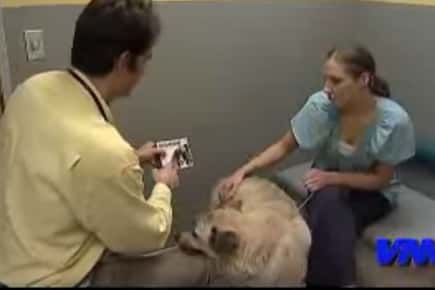
Many of us enjoy snuggling close to our pets and despite misguided news reports detailing health risks, most of us will continue to do so.
But, there is a risk of sleeping with pets and it has to do with diseases carried by our old enemy, the flea. So, what's the best way to shut down this annual pest? Fleas may be one of our pets' worst enemies, but they don't have to conquer your pet or your home.
The most common type of flea in the U.S. is the Ctenocephalides felis…or the Cat Flea. Despite its name, this species will feed from cats, dogs and even humans. These wingless insects attack both people and pets and feed by drawing blood from their host.
While most people relate to the irritation of flea bites, fleas can transmit more serious diseases. Flea allergy dermatitis is certainly the most common problem associated with fleas, but they can also transmit Bubonic Plague, tapeworms and Feline Infectious Anemia.
The challenge of winning the flea battle lies in understanding the flea's life stages, then attacking all levels of the life cycle.
Female cat flea - A single female flea can lay 20-50 eggs at a time, creating over 2000 fleas in her life span of three months. With just 25 adult female fleas that equates to more than a quarter of a million fleas in only 30 days!
The non-sticky eggs fall off the pet, ending up in your carpeting, pet bedding or furniture upholstery. Outdoor environments such as leaf litter, lawn or mulch in moist and shady areas are also ideal environments for egg incubation.
Flea eggs hatch after 1-10 days (depending on the temperature and level of humidity) into larvae. These larvae feed off flea feces and debris, then molts three times in a 5-25 day period before spinning a cocoon (pupae). The flea pupae then hatch in as few as 5-9 days to the fully formed adult….OR they can remain dormant for up to five months.
Adult fleas comprise only about 5% of the entire flea population. The remaining 95% consists of eggs, larvae and cocoons in the pet's environment. It's easy to see how the flea can quickly invade and even overrun your home.
Expert "Flea Guru", Dr. Michael Dryden recommends a combination of products and procedures. The very important first step is a visit to your veterinarian. "You can beat the fleas, but you have to purchase the right products." Flea products obtained from a veterinarian have been proven effective through rigorous testing. Topically applied products like Frontline, Advantage & Revolution have worked well in the battle against the flea as has the orally administered pills, Capstar and Comfortis. With the rapid life cycle of the flea, the product must have a kill ratio of 90-95% to be considered effective. Anything less will not do the job completely.
Dr. Dryden continues "That's not the case for (generally less expensive) over-the- counter products. Natural and organic doesn't necessarily mean safe. I'm all for green and saving the planet. But I am also all for using a product which is proven safe for my pets."
Shampoos and collars are less effective and in some cases can even cause harm to your pet. For example, the wrong dose of your dog's flea product can have devastating and even life-threatening results if given to your cat. It may sound silly, but the EPA estimates that this mistake happens thousands of times every year!
Once the flea does appear, Dr. Dryden promotes a 3-part plan. The first step: eradicate the existing fleas on your pet. Proper product usage is very important and, remember, one dose won't eliminate all the different stages.
Flea spray label - Secondly, it's necessary to ensure that you have rid the premises of the fleas. Use products that contain Insect Growth Regulators (IGRs) to kill flea eggs and larvae. Your outdoor environment may need to be professionally treated. You need to regularly clean the indoor areas frequented by your pets.
Treat ALL dogs and cats….not just the affected pet. And all pets should be treated for at least three to six months to ensure total elimination.
Thirdly, prevent new infestations with lifelong flea control. Using a veterinarian recommended flea product will kill all levels of the flea infestation. If the flea can't reproduce, it will become extinct. However, if even one cycle of flea prevention is missed, the battle will continue.
Knowing how to combat fleas is really more than half the battle. And although they are hardy little critters, we do have safe effective products to fight these bugs. Ask your veterinarian for product recommendations and advice.
